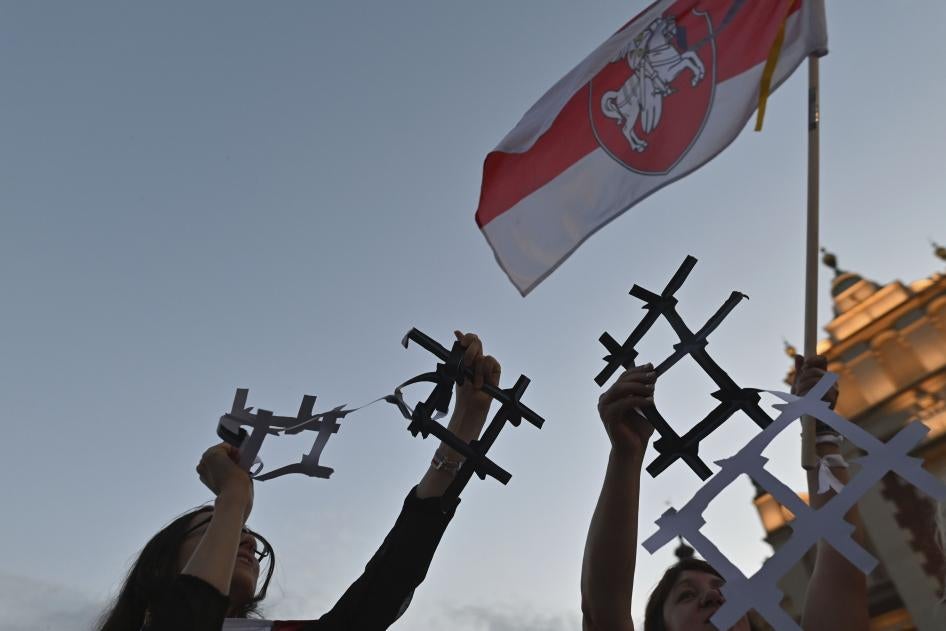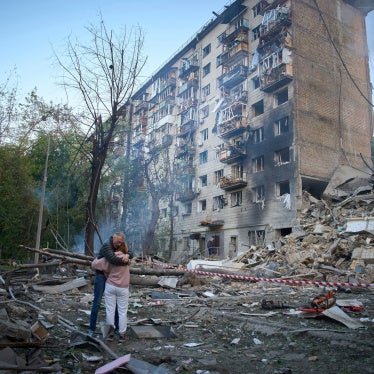(Berlin, January 12, 2023) – Belarusian authorities further escalated their crackdown on dissenting voices and doubled down on eviscerating the vestiges of civil society during 2022, Human Rights Watch said today in its World Report 2023.
Belarusian authorities have prosecuted human rights defenders, journalists, lawyers, opposition politicians, trade union representatives, activists, and peaceful protesters, and brutally suppressed protests against Russia’s war on Ukraine. According to the leading Belarusian human rights group, Viasna, by the end of November, at least 1,443 people faced prosecution on politically motivated charges. Six Viasna activists remained behind bars on trumped up criminal charges, including the organization’s leader and Nobel Peace Prize 2022 laureate, Ales Bialiatski.
“Over the past year, Belarusian authorities kept up a systematic and widespread crackdown on civil society and dissent, forcing more civic activists, journalists, and other critics to flee the country,” said Tanya Lokshina, associate Europe and Central Asia director at Human Rights Watch. “The country has become a zone of raging repression and absolute impunity for rights violations.”
In the 712-page World Report 2023, its 33rd edition, Human Rights Watch reviews human rights practices in close to 100 countries. In her introductory essay, acting Executive Director Tirana Hassan says that in a world in which power has shifted, it is no longer possible to rely on a small group of mostly Global North governments to defend human rights. The world’s mobilization around Russia’s war in Ukraine reminds us of the extraordinary potential when governments realize their human rights obligations on a global scale. The responsibility is on individual countries, big and small, to apply a human rights framework to their policies, and then work together to protect and promote human rights.
The authorities shut down hundreds of civil society organizations, including the country’s leading human rights groups. In January, amendments to the criminal code entered into force, reintroducing criminal liability for participation in activities of unregistered organizations. Currently, no human rights organizations are legally operating in the country.
Belarusian authorities regularly subjected political prisoners to degrading treatment, physical abuse, and other forms of ill-treatment. The authorities sentenced a human rights defender, Nasta Lojka, to repeated 15-day detention periods on bogus charges of “petty hooliganism” in reprisal for her work. In detention, law enforcement officers subjected Lojka to electric shocks and forced her to stand outdoors in cold weather without a coat for eight hours.
Following Russia’s full-scale invasion of Ukraine, Belarusian authorities viciously targeted those protesting or otherwise showing disagreement with Russia’s war and Belarus’ role in it. Belarus has allowed Russia to use its territory to support its forces and to launch missile attacks.
In April, the prosecutor general blocked Human Rights Watch’s website following the publication of one of its reports on Russian war crimes in Ukraine. The Belarusian parliament adopted several legal amendments that further consolidate the current government headed by Aliaksandr Lukashenka.
February constitutional amendments canceled Belarus’ nuclear weapon-free status and exempted former presidents from liability for actions committed during their terms in office, further eroding accountability for grave rights violations under his presidency.
Belarus remained the last country in Europe and Central Asia to have the death penalty. In May, after new amendments to the criminal code entered into force, the authorities expanded the application of capital punishment to attempted acts of terrorism. Numerous activists, including anti-war activists, have faced such charges in the past on politically motivated grounds.
The authorities continued to disbar lawyers who represent political prisoners and created increasing obstacles for their work.
In October, Lukashenka signed into law Belarus’ denunciation of the First Optional Protocol to the International Convention on Civil and Political Rights, blocking the United Nations Human Rights Committee’s mandate to receive and review human rights complaints from individuals in Belarus. It was one of the very few international mechanisms still available to those seeking redress against the government. In November, the UN Human Rights Committee expressed “profound regret” over the action, which is to take effect on February 8, 2023.
Two years after the August 2020 protests following a rigged presidential vote, authorities have not effectively investigated thousands of individual complaints of mass, arbitrary detentions; the use of excessive force; torture; and other ill-treatment by law enforcement against protestors.








